5 books about Caplan, Nigel A.
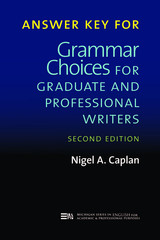
Nigel A. Caplan
University of Michigan Press
This answer key, available only as an ebook, is to be used with the Second Edition of Grammar Choices for Graduate and Professional Writers (Caplan, 2019, University of Michigan Press).
[more]
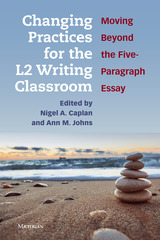
Changing Practices for the L2 Writing Classroom
Moving Beyond the Five-Paragraph Essay
Nigel A. Caplan and Ann M. Johns
University of Michigan Press, 2019
This volume was written to make the case for changes in second language writing practices away from the five-paragraph essay and toward purposeful, meaningful writing instruction. As the volume editors say, “If you have already rejected the five-paragraph essay, we offer validation and classroom-tested alternatives. If you are new to teaching L2 writing, we introduce critical issues you will need to consider as you plan your lessons and as you consider/review the textbooks and handbooks that continue to promote the teaching of the five-paragraph essay. If you need ammunition to present to colleagues and administrators, we present theory, research, and pedagogy that will benefit students from elementary to graduate school. If you are skeptical about our claims, we invite you to review the research presented here and consider what your students could do beyond writing a five-paragraph essay if you enacted these changes in practice.”
Part 1 discusses what the five-paragraph essay is not: it is not a very old, established form of writing; it is not a genre; and it is not universal.
Part 2 looks at writing practices to show the essay’s ineffectiveness in elementary schools, secondary schools, first-year writing classes, university writing courses, undergraduate discipline courses, and graduate school.
Part 3 looks beyond the classroom at testing. At the end of each chapter, the authors--all well-known in the field of second language writing--suggest changes to teaching practices based on their theoretical approach and classroom experience.
The book closes by reviewing some of the major questions raised in the book, by exploring which questions have been left unanswered, and by offering suggestions for teachers who want to move away from the five-paragraph essay. An assignment sequence for genre-aware writing instruction is included.
Part 1 discusses what the five-paragraph essay is not: it is not a very old, established form of writing; it is not a genre; and it is not universal.
Part 2 looks at writing practices to show the essay’s ineffectiveness in elementary schools, secondary schools, first-year writing classes, university writing courses, undergraduate discipline courses, and graduate school.
Part 3 looks beyond the classroom at testing. At the end of each chapter, the authors--all well-known in the field of second language writing--suggest changes to teaching practices based on their theoretical approach and classroom experience.
The book closes by reviewing some of the major questions raised in the book, by exploring which questions have been left unanswered, and by offering suggestions for teachers who want to move away from the five-paragraph essay. An assignment sequence for genre-aware writing instruction is included.
[more]
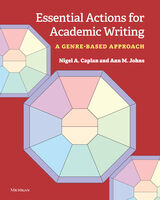
Essential Actions for Academic Writing
A Genre-Based Approach
Nigel A. Caplan and Ann M. Johns
University of Michigan Press, 2022
Essential Actions for Academic Writing is a writing textbook for all beginning academic students, undergraduate or graduate, to help them understand how to write effectively throughout their academic and professional careers. Essential Actions combines genre research, proven pedagogical practices, and short readings to help students writing in their first, second, or additional languages to develop their rhetorical flexibility by exploring and practicing the key actions that will appear in academic assignments, such as explaining, summarizing, synthesizing, and arguing.
Part I:
Part I:
- Introduces students to rhetorical situation, genre, register, source use, and a framework for understanding how to approach any new writing task.
- Demonstrates that all writing responds to a context that includes the writer’s identity, the reader’s expectations, the purpose of the text, and the conventions that shape it.
- Explores the essential actions of academic writing (explain, summarize, synthesize, report and interpret data, argue, respond, and analyze).
- Provides examples of the genres and language that support each action.
- Offers four extended projects that combine the essential actions in different genres and contexts.
[more]
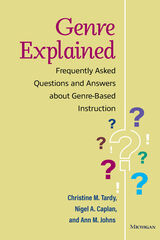
Genre Explained
Frequently Asked Questions and Answers about Genre-Based Instruction
Christine M. Tardy, Nigel A. Caplan & Ann M. Johns
University of Michigan Press, 2023
The idea of teaching writing through genres—rather than, say, through prescriptive forms, templates, and rhetorical modes—is intuitively appealing. Yet many teachers have questions, and they are absolutely right to ask them: What are genres? What is genre-based instruction? What do students write if they don’t write essays? Isn’t it easier to teach and learn five-paragraph essays? What’s the role of language in genre teaching? And many more. These are all excellent questions and ones that new and experienced teachers alike have also struggled with. This book sets out to tackle some of the most common questions that teachers, teacher educators, and administrators may have when moving toward a genre-based teaching approach.
[more]
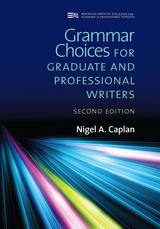
Grammar Choices for Graduate and Professional Writers, Second Edition
Nigel A. Caplan
University of Michigan Press, 2019
Grammar Choices is a different kind of grammar book: It is written for graduate students, including MBA, master’s, and doctoral candidates, as well as postdoctoral researchers and faculty. Additionally, it describes the language of advanced academic writing with more than 300 real examples from successful graduate students and from published texts, including corpora.
Each of the eight units in Grammar Choices contains: an overview of the grammar topic; a preview test that allows students to assess their control of the target grammar and teachers to diagnose areas of difficulty; an authentic example of graduate-student writing showing the unit grammar in use; clear descriptions of essential grammar structures using the framework of functional grammar, cutting-edge research in applied linguistics, and corpus studies; vocabulary relevant to the grammar point is introduced—for example, common verbs in the passive voice, summary nouns used with this/these, and irregular plural nouns; authentic examples for every grammar point from corpora and published texts; exercises for every grammar point that help writers develop grammatical awareness and use, including completing sentences, writing, revising, paraphrasing, and editing; and a section inviting writers to investigate discipline-specific language use and apply it to an academic genre.
Among the changes in the Second Edition are:
Each of the eight units in Grammar Choices contains: an overview of the grammar topic; a preview test that allows students to assess their control of the target grammar and teachers to diagnose areas of difficulty; an authentic example of graduate-student writing showing the unit grammar in use; clear descriptions of essential grammar structures using the framework of functional grammar, cutting-edge research in applied linguistics, and corpus studies; vocabulary relevant to the grammar point is introduced—for example, common verbs in the passive voice, summary nouns used with this/these, and irregular plural nouns; authentic examples for every grammar point from corpora and published texts; exercises for every grammar point that help writers develop grammatical awareness and use, including completing sentences, writing, revising, paraphrasing, and editing; and a section inviting writers to investigate discipline-specific language use and apply it to an academic genre.
Among the changes in the Second Edition are:
- new sections on parallel form (Unit 2) and possessives (Unit 5)
- revised and expanded explanations, but particularly regarding verb complementation, complement noun clauses, passive voice, and stance/engagement
- a restructured Unit 2 and significantly revised/updated Unit 7
- new Grammar Awareness tasks in Units 3, 5, and 6
- new exercises plus revision/updating of many others
- self-editing checklists in the Grammar in Your Discipline sections at the end of each unit
- representation of additional academic disciplines (e.g., engineering, management) in example sentences and texts and in exercises.
[more]
READERS
Browse our collection.
PUBLISHERS
See BiblioVault's publisher services.
STUDENT SERVICES
Files for college accessibility offices.
UChicago Accessibility Resources
home | accessibility | search | about | contact us
BiblioVault ® 2001 - 2024
The University of Chicago Press









